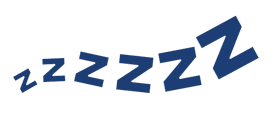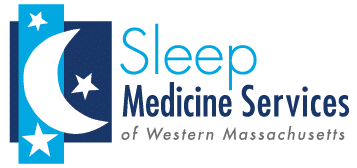What to expect on the night of your sleep study
A polysomnogram (sleep study) is a test that is performed in the sleep center. This test will involve placing several monitors on your head, face, chest and legs. This type of testing provides detailed information on sleep stages, heart rate, respiratory function as well as limb movements. Providers may order this type of study because they are looking for a more comprehensive evaluation of your sleep or you may require monitoring with a type of device that is only able to be used in the sleep lab. Sleep studies can be used to diagnose – sleep apnea, narcolepsy, periodic limb movement disorder, sleep misperception, REM sleep disorder as well as other parasomnias and disruptive sleep disorders.
Our in-lab sleep studies are performed 7 nights a week in our two sleep centers, conveniently located in Northampton and Springfield.

The Night of Your Sleep Study
- Arrive at the sleep center at your scheduled time
- Eat dinner before you arrive so that it doesn’t delay your set-up
- The technicians will greet you and show you to your room
- They will have you complete paperwork (If you’d like to complete your paperwork ahead of time, please review and print the sleep study forms at the bottom of the Documents section of our website)
- They will then begin the process of attaching sensors to various places on your body – head, chest, legs, finger. The setup process will take around 30-45 minutes. the sensors will either have adhesive on them or the technician will use an adhesive to secure them. You will also have a nasal cannula in your nose. This will look similar to someone receiving oxygen, but it will be monitoring your breathing. This can be difficult for children to tolerate, but there are some techniques we can use to help with this.
- The wires should be long enough to allow you to move comfortably, but if they aren’t, let your technician know and they can adjust the wires. Please don’t unplug them without a technician as this can cause inaccuracies in the study or break the equipment.
- You can read, watch TV or use an electronic device such as a laptop while you are settling down and getting used to the new environment; however, it is helpful to only do this for a short time so that you are able to try to get to sleep.
- While you are sleeping, technicians will be monitoring the readings from your equipment from the monitoring room and may come in if they see that a piece of equipment isn’t recording well or if they see that you may be having an abnormality in your breathing or heart rate.
- If you need to get up during the night, a technician will need to be called to disconnect you from the computer so you can walk with your sensors to the restroom.
- You will generally be woken up around 5:45am and the technician will help to remove the sensors
- Any adhesive that may be applied can generally be removed with soap and water, but is likely to be easier to do in a shower than in the sink after a sleep study, so you may want to plan for time between leaving the sleep lab and going to work or school.
Helpful Things to Make Your Sleep Study Go Well
Pediatric patients are required to have a parent or guardian stay with them at all times overnight. Outside of this, sleep study rooms are generally only able to accommodate one person. We do make accommodations for patients who need additional assistance, but need to be made aware of this need ahead of time to ensure there is space and an available cot for the caregiver.
If you are not a pediatric patient, but you have some other needs, such as a disability, require an adjustable bed or assistance with caregiving or translation, please contact the office so that we can ensure that we are able to schedule you on a night when this is able to be accommodated.
- Continue medications ordered by your physician/provider (no medications will be given by the Sleep Lab staff
- Bring your own sleepwear
- Bring a list of all medications. Bring any medications you may need during the night
- Bring your PAP mask, remote or oral appliance if you are coming in for a titration study. If you don’t have a mask, the sleep lab will provide one for
the night of the study - If you are diabetic, bring insulin and a snack
- If you are taking sleeping pills, bring them with you and take as usual
- Do not consume large amounts of caffeine 8 hours before the sleep study
- Do not take a nap during the day of the sleep study
- Do not use hairspray, gels, mousse, etc., the day of the sleep study
- Remove gel nail or artificial nail and nail polish from at least one finger before arriving at the sleep lab for proper monitoring of your oxygen
- For proper placement of electrodes, skin and hair must be clean and dry at the time of your visit. Dirt, oils, and/or skin care products can adversely affect the readings
- Sleep Lab closes promptly at 7am. All patients requiring transportation in the morning must arrange for pick-up before this time. Seating is provided in the lobby of the building for anyone requiring a later pick-up time
- Smoking and vaping are not permitted in the building or during the sleep study
You must be accompanied by a family member/significant other (i.e. caregiver/nursing assistant/staff member of your nursing facility) who can stay with you during the study:
- If you are under the age of 18
- If you are significantly disabled, physically or mentally
- If you need special assistance, for example – using the bathroom, changing
urinals, overnight briefs, etc.
Please ask your Sleep Technologist about any problems or concerns that you may have during your study. At your request, the technologist will consult with the Medical Director and/or Administrative Director for advice and directions
IF YOU NEED TO RESCHEDULE OR CANCEL YOUR APPOINTMENT, IT IS REQUIRED THAT YOU GIVE 24 HOURS NOTICE OR YOU WILL BE CHARGED A $150 FEE
Results:
We aim to have the results completed within 2 weeks, but this can vary depending on staffing and volume and complexity of sleep studies.
Side Effects:
While it is uncommon for there to be side effects from a sleep study, some people experience irritation from adhesive and tape or may not sleep as well because they are in an unfamiliar location.
At Sleep Medicine Services, we do several types of overnight sleep studies:
Must be accompanied by a parent or guardian. This is a baseline sleep study to evaluate any sleep disorders that may be present during your sleep, interfering with your sleep or leading to daytime sleepiness.
A baseline sleep study to evaluate any sleep disorders that may be present during your sleep, interfering with your sleep or leading to daytime sleepiness
This is a sleep study using a treatment to evaluate the effectiveness of the treatment. During this study, you will use a treatment for management of sleep apnea and the technician may adjust this treatment to fine tune your care and improve results. Treatments can include an oral appliance, CPAP, BIPAP, BIPAP ST, ASV or IVAPS device, or Inspire implant. If you use an oral appliance, please bring this with you to your study. If you are using a device to sleep at night, you can bring your own mask, but you do not need to bring your machine. We have devices in the office that connect to the computer that will be used during your study. If you use Inspire, please bring your remote.
This is a combination of the two sleep studies listed above. This is often done if you have a history of sleep apnea or if there is high suspicion that you have this diagnosis. The first part of the study is done to evaluate any breathing concerns that you may have during sleep and if there is significant sleep apnea noted, the technician will bring in a mask and begin titrating treatment with a CPAP device for the rest of the study.
This is a sleep study that is used to diagnose narcolepsy. This is done after an overnight sleep study. If you have sleep apnea, this will need to be treated on the night of your overnight sleep study, so plan to have a sleep study with your current treatment that night. You will come overnight for a sleep study and then stay the following day for a series of 5 naps. A light lunch will be provided. You will generally be done with your test by 4:30pm the next day.
